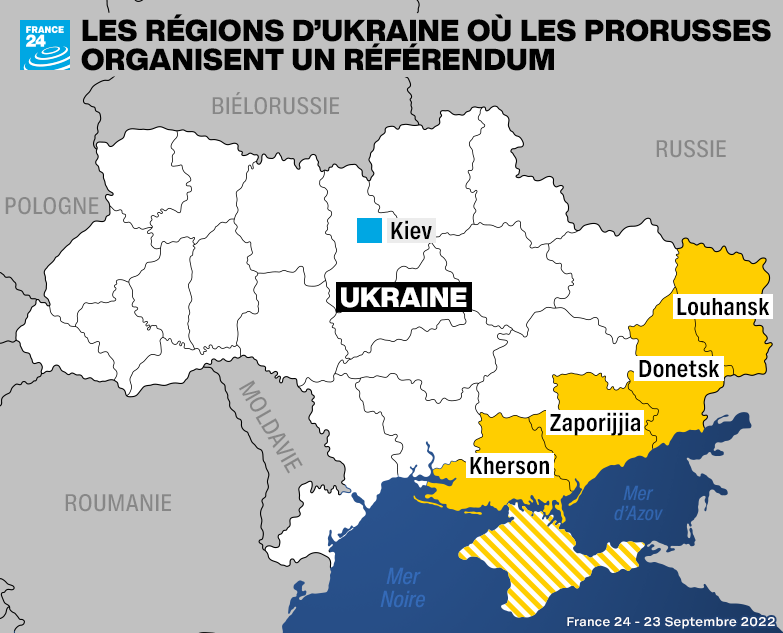The provinces of Donetsk and Lugansk, in the east of Ukraine, as well as Kherson and Zaporizhia, in the south, end this Tuesday, September 27, five days of voting in referendums imposed by Moscow to annex regions totally or partially invaded by its troops. The Russian Parliament plans to formalize the annexations on October 4, which represent 15% of the Ukrainian territory. The European Union announced sanctions for the organizers of the consultations.
“Historic vindication” for the Kremlin and a “farce” for Western leaders.
Moscow concludes this September 27 the five-day vote in referendums to annex four regions of Ukraine, controlled totally or partially by the invading troops.
The first partial results of the consultations organized in Donestsk and Lugansk, in the Ukrainian east, and Kherson and Zaporizhia, in the south, show an “overwhelming” victory of the “Yes” to accession, according to the Russian state news agency ‘ ESTUARY’.
The official media specified that the initial counts showed majorities ranging from 96.97% in the Kherson region, based on 14% of the votes counted, to 98.19% in Zaporizhia, with 18% counted.
The Kremlin was already expected to report a victory for its referendum, organized by separatist leaders backed by Moscow, the deployment of Russian military in the streets of towns it controls and kyiv’s complaints of coercion of residents.
Among them, forcing citizens to vote and the prohibition to leave the area where they reside during the days in which the votes have taken place, as denounced by the mayor of Lugansk, Sergey Haidai.

However, in an attempt to justify the award of territories to its neighboring country, the Russian Ministry of Defense published a seven-minute video on its official Telegram channel on Tuesday. In it he shows what he claims are interviews with Ukrainian citizens voting in the Belgorod region of Russia, some 40km north of the Ukrainian border.
In addition to the Ukrainian regions mentioned, ballot boxes were opened in Russian towns, where refugees from the invaded regions can cast their votes.
“With the collapse of the Soviet Union, everything got very bad and over time our region, you could say, was destroyed. We are only for the Russian Federation, we are only for Russia. We speak Russian, we study in Russian schools,” said a person identified by the Putin government as Vladimir Buinak.
This referendum process is widely criticized by kyiv and a large part of the international community, who denounce it as a “false vote” and “rigged” to justify the invasion.
The Russian Parliament plans to formalize the Ukrainian annexations on October 4
In the middle of the last day of consultations, Valentina Matvienko, president of the Federation Council, the Upper House of the Russian Parliament, assured that she could consider the incorporation into Russia of the parts of the four Ukrainian regions put to the vote for next Tuesday 4 October.
The places where voting takes place represent 15% of the Ukrainian territory. But after the polls close, the government of Vladimir Putin will add 20% of the neighboring country if the province of Crimea is taken into account, which was awarded in a similar move in 2014.

Last February, days before ordering the conflict, the Kremlin backed the independence of Donetsk and Lugansk, which it now hopes to make them part of its territory.
In the case of Kherson, the invading troops control around 95%. In Zaporizhia, kyiv still dominates much of the region, so it is unclear how Moscow’s annexation of those areas would be applied.
The truth is that the experts point out that with the culmination of the referendums, Putin will not only achieve part of his main objective: to control Ukraine; he will also have the perfect justification to intensify the conflict that has been going on for seven months and advance his plans for territorial expansion.
Faced with a foreseeable military campaign by the local Army to recover its territories, the Kremlin leader will be able to justify defending towns and cities that now belong to him, which would dramatically intensify the war.
The European Union announces sanctions for the organizers of the disputed referendums
The European Union (EU) announced that it will impose sanctions on the organizers of “illegal” voting in Ukraine.
“There would be consequences for all the people who participate in the illegal and illegitimate referendums,” said Peter Stano, spokesman for the EU’s foreign policy chief, Josep Borrell, as the vote unfolded for the fifth and final day.

The information was ratified by Luc Devigne, a high-ranking official of the European External Action Service, who told the legislators of the 27-country bloc that “we will include people who are obviously linked to the recent steps with these referendums” in the measures of retaliation
Brussels is deliberating on new punishments for Moscow for holding the vote widely dismissed by the West as a “farce”.
Devigne did not detail what the next package of sanctions would contain, but explained that it would include new prohibitions on Russian exports and imports and extend the punishments to some commercial activities of the invading country, in addition to adding “new lists of companies and individuals.”
With Reuters and AP













